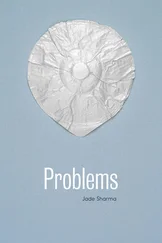No relatives will keep me in their home for long. I lived with Rajinder's family for a month after he died. Even to think of being homeless, of remembering to put back in your suitcase everything you take out, is exhausting.
In the morning and during the day I think. If Pitaji tries to force us from the flat, I will stand on the gallery yelling his crimes to the compound till he relents. I know this is not a good plan.
Pitaji does not leave his room.
At night I keep a hammer beside me. Several hours after going to bed I hear water splashing in the latrine bucket. It is a hollow sound at first, and then, as it thickens and my mind rouses, I know Pitaji is no longer in his room. I had expected Bittu Mamaji and Shakuntala Mausiji to come during the day and see what was happening. Again I count the money I have taken from Pitaji. If I did not have to pay for housing or Asha's school, we could live on it for a year.
In the morning Asha goes to school. I spend the day waiting for Pitaji. He does not appear. The next day also passes this way. At night the refrigerator door opens and closes and the water bottles clink. I grip the hammer's wooden handle. Pitaji bathes. Like a child afraid of moving in her bed for fear of attracting the ghost that is in the room, I lie still. Once, I squeeze Asha's hand so tightly that she wakes hitting me. A week goes by without my seeing Pitaji. One morning I find his undershirt bunched on a chair in the common room. I become so panicked, I throw it into the squatter colony.
During the day, when I am alone, any unexpected sound can cause my heart to thump. At night I dream regularly that my hammer is being wrested away I put a knife under the bed. Sometimes I wake to find the light from the common room bleaching the darkness on my face. Another week goes by.
When Asha is at school and Pitaji is behind his blue door, the idea that there is no one to help me makes me so lonely and afraid that I begin boiling sheets or washing all the walls with soap. By working hard I can prove the flat is mine.
With Asha home, I feel better, even though we hardly speak. She often goes to the roof with her schoolbooks. Asha never mentions Pitaji's absence. Once, I ask her what she is thinking. Asha answers, "I didn't say anything."
Waiting distorts time. I sometimes imagine I will get white-haired and Asha will leave home for college and then one day Pitaji will emerge from his room unchanged.
But I know Pitaji will reappear soon. To delay this, I begin preparing elaborate meals for Pitaji before going to bed. I hope that if he has good food he will be less likely to reenter the world. Every morning I also slip the newspaper, unfolded till it is thin enough, under his door.
Weeks into this strategy, its purpose changes. I now cook as a bribe, to diminish the anger he will feel when he finally starts living in the day Perhaps we can return to where we were. We could live together again. The purpose alters, because I realize Pitaji cannot stay in his room forever. When he comes out he might force Asha and me to leave the flat.
One morning, while I am in the kitchen cleaning the breakfast plates, Pitaji's door opens. He is wearing pajamas with an undershirt. His face is gray with beard. My blood fizzes from adrenaline. My hands become numb. Pitaji stares at me. His beard makes him look dangerous. As his mouth twists to speak, I run to the balcony, up the ladder, to the back of the roof
My fear is so basic that I do not understand it. Until I saw Pitaji, I had been willing to live with him. I take small breaths. Delhi's roofs line all the horizon. Pitaji had said that if I told people, in a year or two he would forget his shame and repeat his crime. This I know will occur. This is his nature.
I come down in an hour. Pitaji is back in his room, his door closed.
Later, I am kneeling on our bed, ironing a sari, when Pitaji reappears. My back is to him as he enters our room. I spin around. I consider leaping to the gallery and then down the stairs. Pitaji has shaved. He stares at me. He has on pants, shirt, and shoes. His lips are parched white. I had wanted to wall him from the world by revealing his crimes. His leaving the flat means I have failed and shame has no power over him.
"I didn't do anything to Asha," Pitaji says.
"Enough. What you did."
Pitaji stands and watches me for minutes. I cannot look away. All the weight he has lost makes his face drape. Pitaji touches a cheek with his fingertips. This is a new mannerism and I wonder if it
comes from being alone too long. Pitaji appears to shake before me, like broken film fluttering in a projector.
"You don't have to leave," he offers softly.
"I wouldn't. Even if you tried. The flat is mine."
Pitaji is quiet, as if he is planning. After a while he says, "I'm not so bad a man."
I laugh. In my fear I had forgotten how strange he is. He keeps looking at me. I wonder what he is thinking. Pitaji goes out into the sun.
I continue to press the sari. Pitaji will attack Asha someday. This is as likely as gravity I must now leave these rooms and live the rest of my life on other people's kindnesses. Maybe Kusum can give me money, but I cringe at the thought of her resentful generosity.
The hot press releases a sweet soap smell from the clothes. I was the first person in our extended family to own a press. Rajinder bought it for me. Rajinder was hard. Once, when we were robbed by a cleaning woman, he demanded the police beat her till she showed us where she had hidden my bracelets and Rajinder's watch. I do not have the courage to go to the police and make up a story that Pitaji tried to rape Asha.
Perhaps an hour later, as I put the clothes in their cupboard, I hear a neighbor outside say, "What are you thinking, Karanji?"
"Nothing," Pitaji answers. I peer into the gallery. He is standing at the very end, near the steps to the compound. His back is against a wall and he is looking straight ahead, with his shoulders hunched and a hand on his cheek.
Pitaji returns. He walks past me without meeting my eyes, goes into his room, closes the door.
Pitaji's room can be bolted from the outside. The bolt makes a scratching noise when I draw it. I do not think about what I am doing till the bolt is at rest. Pitaji must have heard me, but he does not ask me to unbolt the door.
I then take Pitaji's medicines, his diuretics and beta blockers, his brown glass bottles, orange plastic vials, two cardboard boxes, one of pink tablets and another of blue, from the refrigerator and throw
them in the dustbin on the balcony. I do this and go to the living room. I stand there shifting from one foot to the other. I enter the common room briefly and see Pitaji's locked door. I go to my room, where I sit on my bed and look at the floor while gripping my knees. Ten minutes later, not certain whether I am hiding my act or keeping Pitaji from saving the medicines, I shake the dustbin into a polythene bag, race from the flat, down into the alley, throw the bag into a garbage woman's wheelbarrow.
Soon after Asha returns from school, Pitaji knocks on his door. Because he did not first try to open it, I know he was aware of being locked in. Asha, still in her uniform, is drinking water near the refrigerator. I unbolt the door and step aside. Without looking at me, Pitaji goes to the latrine. I wait next to the door. I do not acknowledge Asha's gaze. When Pitaji returns, he pulls the door shut behind him.
Asha goes to the roof with her school bag.
I am ashamed of myself and want to love her. From the balcony I call, "Do you want juice?"
Asha comes to the top of the ladder and looks down. "I will forget you. Both of you. When you are dead, no one will ever think of you." I want to grab Asha and beat her till she falls to the ground crying.
Читать дальше












